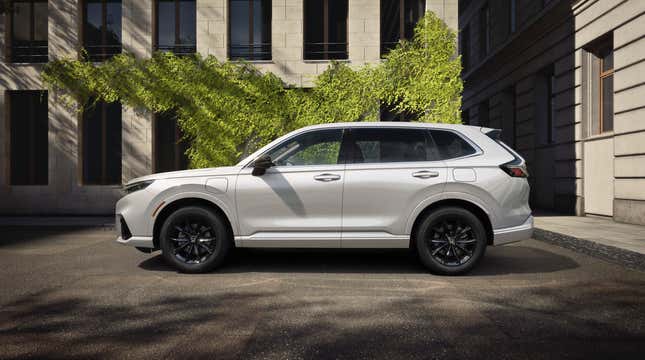Fuel Efficiency in the 2025 Honda CR-V: A Deep Dive into the Future of Driving
Fuel Efficiency in the 2025 Honda CR-V: A Deep Dive into the Future of Driving
Introduction
In this auspicious occasion, we are delighted to delve into the intriguing topic related to Fuel Efficiency in the 2025 Honda CR-V: A Deep Dive into the Future of Driving. Let’s weave interesting information and offer fresh perspectives to the readers.
Table of Content
Fuel Efficiency in the 2025 Honda CR-V: A Deep Dive into the Future of Driving

The Honda CR-V has long been a popular choice for drivers seeking a balance of practicality, reliability, and fuel efficiency. As the automotive industry continues to prioritize sustainability, the 2025 model year promises to push the boundaries of fuel economy even further. While specific fuel efficiency figures for the 2025 CR-V are not yet available, a comprehensive analysis of current trends and technological advancements provides insight into what drivers can expect.
Factors Influencing Fuel Efficiency in the 2025 Honda CR-V
Several key factors will contribute to the fuel efficiency of the 2025 Honda CR-V, including:
- Engine Technology: Honda is known for its efficient engines, and the 2025 CR-V is likely to feature an updated version of the current 1.5-liter turbocharged four-cylinder engine. This engine, already known for its impressive performance and fuel economy, will likely benefit from further refinements, such as improved combustion efficiency and reduced friction.
- Hybrid and Plug-in Hybrid Options: Honda has already introduced hybrid versions of the CR-V, and the 2025 model year is expected to expand these offerings. Hybrid and plug-in hybrid powertrains combine gasoline engines with electric motors, providing a significant boost to fuel efficiency. The integration of advanced battery technology and regenerative braking systems will further enhance energy efficiency.
- Aerodynamic Optimization: Streamlined bodywork and optimized underbody panels reduce air resistance, contributing to improved fuel economy. The 2025 CR-V will likely benefit from further aerodynamic refinements, including active grille shutters and optimized wheel designs.
- Lightweight Materials: The use of lightweight materials, such as aluminum and high-strength steel, reduces the overall weight of the vehicle, resulting in improved fuel economy. The 2025 CR-V is expected to incorporate these materials strategically to minimize its weight without compromising structural integrity.
- Advanced Transmission Technology: The 2025 CR-V will likely feature a continuously variable transmission (CVT) or an updated version of its current automatic transmission. These transmissions are designed to optimize gear ratios for maximum efficiency, ensuring smooth acceleration and optimal fuel consumption.
- Driver Assistance Systems: Features like adaptive cruise control and lane-keeping assist can help drivers maintain a consistent speed and avoid unnecessary acceleration and braking, contributing to improved fuel efficiency. The 2025 CR-V will likely include advanced driver assistance systems that further enhance fuel economy.
The Importance of Fuel Efficiency in the 2025 Honda CR-V
Fuel efficiency is not just about saving money at the pump; it is a critical factor in reducing our environmental impact. As the demand for fuel-efficient vehicles continues to grow, the 2025 Honda CR-V is poised to play a leading role in promoting sustainable transportation.
Benefits of Improved Fuel Efficiency in the 2025 Honda CR-V
- Lower Fuel Costs: The most immediate benefit of improved fuel efficiency is lower fuel costs. Drivers will spend less on gasoline, reducing their overall transportation expenses.
- Reduced Environmental Impact: By burning less fuel, the 2025 CR-V will emit fewer greenhouse gases, contributing to a cleaner environment. This reduction in emissions is crucial in the fight against climate change.
- Increased Driving Range: With greater fuel efficiency, the 2025 CR-V will be able to travel further on a single tank of gas, providing greater peace of mind for long journeys.
- Enhanced Performance: While fuel efficiency is a priority, Honda will ensure that the 2025 CR-V maintains its performance and driving dynamics. Improved fuel economy will not come at the expense of power or responsiveness.
FAQs Regarding Fuel Efficiency in the 2025 Honda CR-V
Q: Will the 2025 Honda CR-V offer a pure electric powertrain?
A: While Honda is committed to electrifying its lineup, a pure electric CR-V for the 2025 model year is unlikely. However, the company may introduce a plug-in hybrid option with a longer electric range, bridging the gap towards fully electric vehicles.
Q: How will the 2025 CR-V’s fuel efficiency compare to its predecessors?
A: Based on current trends and technological advancements, the 2025 CR-V is expected to offer significant improvements in fuel efficiency compared to previous models. It is likely to surpass the current CR-V’s EPA-estimated fuel economy of 28 mpg city, 34 mpg highway, and 31 mpg combined.
Q: What factors can influence the actual fuel economy achieved by the 2025 CR-V?
A: Actual fuel economy can vary depending on driving conditions, such as traffic, speed, and terrain. Driving habits also play a role, with aggressive acceleration and frequent braking leading to higher fuel consumption.
Tips for Maximizing Fuel Efficiency in the 2025 Honda CR-V
- Maintain Proper Tire Pressure: Underinflated tires increase rolling resistance, reducing fuel efficiency. Regularly check and adjust tire pressure to the manufacturer’s recommendations.
- Drive Smoothly: Avoid rapid acceleration and braking, as these actions consume more fuel. Maintain a steady speed and anticipate traffic flow to minimize unnecessary acceleration and deceleration.
- Minimize Idling: Turn off the engine when stopped for extended periods, such as at traffic lights or while waiting for someone.
- Utilize Cruise Control: Cruise control helps maintain a consistent speed, minimizing fuel consumption.
- Avoid Heavy Loads: Excess weight in the vehicle increases fuel consumption. Remove unnecessary items from the car to reduce its overall weight.
- Regular Maintenance: Ensure that your vehicle is properly maintained, including oil changes, air filter replacements, and other routine services.
Conclusion
The 2025 Honda CR-V promises to continue its legacy of fuel efficiency, offering drivers a practical and sustainable option for their transportation needs. The combination of advanced engine technology, hybrid powertrains, aerodynamic optimization, and driver assistance systems will contribute to significant improvements in fuel economy, reducing fuel costs and environmental impact. By embracing these technological advancements, Honda is demonstrating its commitment to a greener future, making the 2025 CR-V a compelling choice for environmentally conscious drivers seeking a balance of performance, practicality, and fuel efficiency.








Closure
Thus, we hope this article has provided valuable insights into Fuel Efficiency in the 2025 Honda CR-V: A Deep Dive into the Future of Driving. We appreciate your attention to our article. See you in our next article!